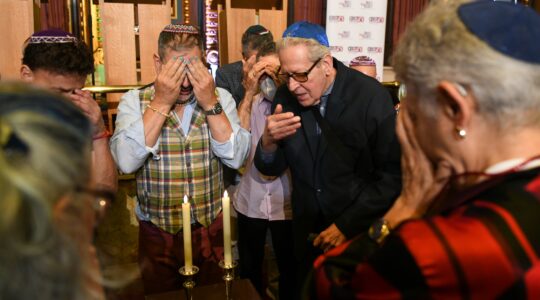Republican presidential frontrunner Donald Trump warned Rhode Island voters Monday to “lock your doors” because Syrian refugees resettling in their state could break into their homes.
At the same time, 500 miles west, a Pittsburgh synagogue is reaching out to the Syrian refugees settling in their community.
“All of the rhetoric about not allowing in Syrian refugees is what absolutely galvanized us [to act],” said Marian Allen, social action chairperson at Rodef Shalom Congregation, a Reform synagogue. “We see it as holy work. It’s a biblical injunction to welcome the stranger because we were once strangers.”
Trump told Monday’s rally in Warwick, R.I., that there were Syrians being resettled in their midst and “we don’t know who these people are, we don’t know where they’re from. … Lock your doors folks, OK, lock your doors. There’s no documentation, we have our incompetent government people letting them in by the thousands, and who knows, maybe it’s ISIS.”
Mark Hetfield, president and CEO of HIAS, the only Jewish organization out of nine designated by the federal government to handle refugee resettlement in the United States, told The Jewish Week that all refugees admitted to the U.S. are carefully screened — and Syrians even more so.
“The system is secure to a fault,” he said. “Opponents to the admission of refugees like to say [President Barack] Obama opened the flood gates to Islamic terrorists. Nothing could be further than the truth. He has shut the door to many innocent refugees who are trying to escape.”
HIAS, formerly known as the Hebrew Immigrant Aid Society, is the smallest of the nine refugee resettlement agencies in the U.S. Its largest resettlement communities are Pittsburgh; Toledo, Ohio, and Springfield, Mass.
The Jewish Family & Children’s Service of Pittsburgh is the local resettlement agency HIAS is working with in that city, and Rodef Shalom there is the one synagogue actively working with the refugees, according to Leslie Aizenman, the Pittsburgh agency’s director of refugee and immigrant services.
“The first Syrian refugees we resettled — eight families — started coming in December,” she said. “There have been 41 people, including a butcher, a small businessman, a farmer, one student, a young wife and baby. One woman who was pregnant in December gave birth to the couple’s sixth kid in February, and our staff was in the delivery room with them.”
The husband, who was a farmer, is now working as a housekeeper at a local hotel. In fact, two to three months after they arrived, at least one member of each of family had a job.
None of the 41 Syrians speaks English, none are Jewish and all were enrolled in an English class when they arrived.
“Once they start work, they try to fit in the classes, and we have volunteers who go to their homes to practice English with them,” Aizenman said.
Allen said the synagogue has worked with other refugees resettling in Pittsburgh, and has just been asked by the Jewish Family & Children’s Service to house a camp for about 40 refugee children — including some of the 25 Syrian children — this summer.
Rodef Shalom’s spiritual leader, Rabbi Sharon Henry, said her congregation has not yet discussed the camp request but is “looking forward to the day when we can open our doors to refugees.”
Asked if there was any fear of the Syrian refugees, the rabbi replied: “I can’t say if there is any fear connected with them. I hope people will treat people for who they are and not approach them from a place of fear.”
Aizenman said that, given the Syrians’ plight, resettlement efforts have been done with little fanfare.
“These people are from trauma situations and we have to be careful and sensitive to their needs,” she explained. “We are there with them and we are working with the Muslim community. We have a language and geographical barrier.”
Hetfield, however, said that with the help of a translator he had a chance to visit with some of the Syrian refugees in Pittsburgh.
“They said that in school they had been taught that Jews are bad people,” he recalled. “They said they now know that is not true, that Jews have done more for them than anybody ever did. And they said that when the rest of their family comes over, they would like HIAS to handle their resettlement.”
Allen said synagogue members want to help all refugees, about 500 of whom are resettled in Pittsburgh each year. Recently, she said, congregants helped refugees from several countries who had arrived in the U.S. a year ago fill out applications for a green card, which transitions them from refugee status to legal permanent residents. After another four years, they are eligible to apply for American citizenship.
HIAS and the Rodef Shalom Congregation are just two of several Jewish organizations helping 4.8 million fleeing Syrian refugees. Out of 60 million displaced persons in the world, 20 million are refugees and Syrians are the largest number, representing 19.8 percent of them, according to Shadi Martini, senior refugee adviser for the Multifaith Alliance for Syrian Refugees. A coalition that began with 13 Jewish organizations in 2013 and now has more than 40 groups of various faiths, the alliance raises awareness and emergency funds for Syrian refugees.
Martini said despite their large number overall, the number of Syrian refugees who have been resettled is small. In the United States, only 3,500 have been resettled since October 2013. But this year, he noted, 10,000 Syrian refugees have been approved to be resettled here.
But before the U.S. or other countries consider an applicant, he or she must first be investigated by the Office of the United Nations High Commissioner for Refugees. Those who pass are then referred at random to different countries for resettlement.
Hetfield said that between October 2013 and last month, UNHCR made 109,000 referrals to all countries — 38,000, or 30 percent, to the U.S. alone. He said the fact that only 9 percent of those referred were resettled here “shows how inefficient the U.S. is.”
Hetfield pointed out that Syrians seeking refugee status here are screened by 11 different branches of the government — more than refugees from any other nation.
“The Syrian refugees undergo enhanced interviews which are twice as long as for other applicants,” he said. “There are layer upon layer of checks, and it all occurs in a black box. If there is anything on you, a yellow flag goes up. They won’t tell you why, so there is no chance to cure the problem. And if just one family member has a yellow flag, the whole family is off the list.”
Those admitted here as refugees received three months of federal assistance. Hetfield said UJA-Federation of New York “has been very helpful in providing resources to fill the gap in funding for the Jewish cases.”
Among the other Jewish groups helping Syrian refugees is the Afya Foundation in Yonkers. Founded in 2007 by Danielle Butin, it makes arrangements with hospitals in the New York area to donate medical equipment that is being replaced and drugs they can no longer use because of government regulations. In addition, its trucks pick up hospice beds, wheelchairs and walkers that are no longer being used.
“One man’s trash is another man’s treasure,” Butin said.
The organization began helping Syrian refugees after conducting a site visit to the Greek island of Lesbos two months ago to see how Syrian refugees there were faring as they waited to resettle in Europe. Butin said she and a colleague visited the island’s one hospital and were asked for 14,000 pairs of surgical gloves. And a new wing had no medical exam table, and was lacking other supplies.
They returned home and have already shipped to the hospital three containers of material weighing 60,000 pounds.
Butin said that as part of their bar and bat mitzvah projects, students at area synagogues often help the organization gather needed material, such as twin sheets for donated beds.
“The kids come in and get very real, significant projects to take on that could have a direct impact on people’s lives abroad,” she said.
The New York Jewish Week brings you the stories behind the headlines, keeping you connected to Jewish life in New York. Help sustain the reporting you trust by donating today.




